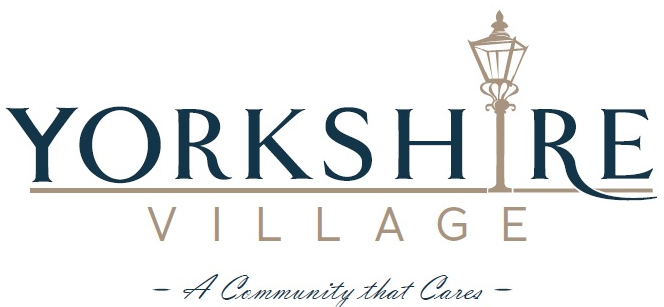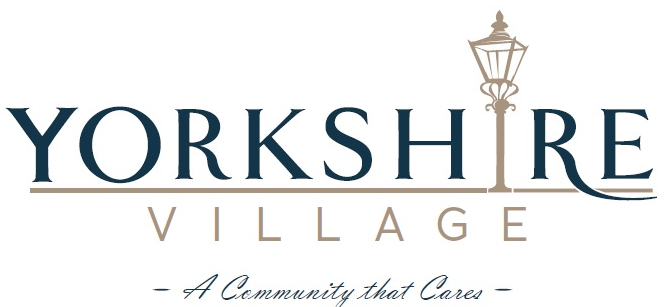Assisted Living vs. Memory Care: How to Decide?
by Yorkshire VillageOnce you have come to the decision that it’s time for your loved one to move to a retirement community better equipped to handle their needs, it can often be difficult to know where to start or where would be the ideal environment to make sure they receive the care and attention they need. If they are struggling with Alzheimer’s disease or dementia it can further complicate the issue. To help make sure you’re making the right choice it’s important to first understand the differences between assisted living, memory care and what it means when a facility offers both.
A common misconception is that assisted living and memory care are the same but while many assisted living communities do offer memory care services, there are key differences between them. If you’re loved one has Alzheimer’s disease it’s essential that you make sure the community you choose offers all of the services and support they need.
These assisted living facilities that also offer memory care are often referred to as a continuing care retirement community or life plan communities and could be a great option for your loved one.

The first step in understanding the differences between these two is to first define what assisted living and memory care are.
What is Assisted Living?
An assisted living community or residence offers housing for seniors or people with disabilities who can no longer live at home or independently. Assisted living has become one of the most common forms of residential care for the elderly.
Generally, the best assisted living facilities will include services such as:
- Private personalized living spaces designed for comfort and safety.
- Individualized care plans.
- Physical fitness activities and games.
- Three nutritious home-style meals
What is Memory Care?
Memory care is a form of long-term nursing specifically conducive to caring for and nurturing residents with dementia, Alzheimer’s and other types of problems related to memory. In many cases, a memory care facility will offer 24 hour supervised care for residents.
Similar to assisted living, a memory care community cares for residents who can no longer care for themselves, however, an assisted living facility that offers memory care services needs to be prepared for the special requirements and symptoms that present themselves for residents suffering from these types of progressive memory issues.
Here is what can make memory care different from standard assisted living and the things you should be considering before making your decision:
Extra Security and Safety Precautions
Although some assisted living communities offer secure areas for residents, memory care often requires an extra level of focus on security. Advanced dementia and Alzheimer’s can come with a range of security concerns that require an emphasis on security to keep residents safe. For example, you want to make sure the retirement community is prepared for residents wondering off; a very common symptom in the advanced stages of dementia.
Memory care communities will also feature extra safety and environmental precautions that allow residents with dementia a safer living space. Additionally, because many suffering from dementia have an increased tendency to become anxious or confused, an added focus is placed on creating a more relaxed environment.
- Takeaway: Make sure the memory care facility is designed to keep your loved one safe and the staff is prepared for when symptoms present themselves. Try to ask if safety checks are done and if so, how frequently.
Staff to Patient Ratio
While staff to patient ratio is an important component to assisted living, it can be even more important for a memory care facility. Often there are no set guidelines for a staff to patient ratio in assisted living but due to the extra care that residents with Alzheimer’s and dementia require, a much higher ratio is needed to keep them safe.
A Higher Level of Training
It’s not uncommon for both assisted living and memory care facilities to share a similar staff but when it comes to memory care; it’s even more important that the staff has been trained in all aspects of memory care. Whether it’s having a strong grasp of how these diseases surface, understanding why symptoms present themselves and knowing how to react, or the best way to interact with residents who might be dealing with them.
- Takeaway: Ask about the staff to resident ratio and make sure the staff is equipped and trained in all aspects of memory care.
Extra Memory Care Activities
Assisted living facilities will often host activities and events for their residents but those that offer memory care will routinely provide special activities conducive to their needs. These activities are designed to promote socialization and keep residents happy and calm. Residents with dementia benefit from these activities that keep them stimulated and distracted when they start to feel anxious or stressed.
- Takeaway: Find out if the facility offers routine activities and additional programs that keep memory care residents engaged in their surroundings.
Special Dietary Requirements
While assisted living communities offer meals and address dietary requirements, residents dealing with dementia often have a higher level of needs when it comes to meals. Proper nutrition and loss of appetite can be a major concern for those with dementia and it’s important that the facility is prepared to deal with these special dietary requirements.
- Takeaway: Make sure the facility offers nutritious meals to suit the added needs of those dealing with dementia and a setting conducive to proper eating habits.
Specialized Memory Care Services
While memory care offers a range of care services similar to assisted living; residents with dementia or Alzheimer’s require additional services and programs. Whether it’s a higher level of nursing care, added attention to housekeeping or even support for family members to help them deal with their loved one; it’s essential that the community you choose offers specialized services specifically for memory care residents.
Memory care communities will offer structured services designed to care for those suffering from dementia. For example; at Yorkshire Village we offer a range of memory care services including:
- Supportive and secure environments
- Person-centered approach to daily care
- 24/7 assistance
- Individualized care plans
- Specially designed living spaces
- Peace of mind safety features
Deciding on whether your loved one needs memory care can be difficult but making sure the facility you choose is equipped to handle their needs can make all the difference. The more you research and questions you ask the more piece of mind you can have that your loved one is in good hands.
If your loved one is struggling with Alzheimer’s, dementia or other cognitive impairments finding a memory care community or an assisted living facility that offers memory care services could be the right choice to ensure they are cared for, happy and healthy.
If you have questions on whether memory care is the right choice for your loved one, contact Yorkshire Village or schedule a tour of our facility and witness our dedicated staff and superior life-enhancing services firsthand.

